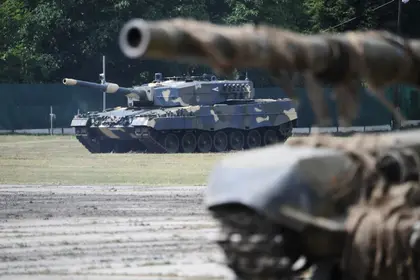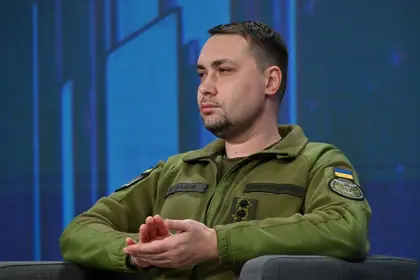An informal coalition of Western countries is ready to deliver Leopard-2 tanks and other offensive weapons to Ukraine. Meanwhile in Russia, internal power struggles and reshuffles seek to reassert General Valery Gerasimov’s authority and sideline “Wagner” leader Yevgeny Prigozhin.
Read about these and other events in the weekly review of the Information Defense project.
JOIN US ON TELEGRAM
Follow our coverage of the war on the @Kyivpost_official.
International Tank Coalition
In a previous post, Information Defense project experts emphasized that a critical success factor for the Ukrainian Armed Forces (UAF) is its ability to conduct offensive attacks. It needs to have sufficient modern Western weapons, tanks, artillery, and light infantry fighting vehicles. At present, there is not enough of this equipment to conduct offensive operations either now or in the spring.
In general, insufficient equipment has been the UAF’s Achilles’ heel. But following President Volodymyr Zelensky’s visit to the U.S. at the end of December 2022, the situation has changed qualitatively – it seems that all restrictions on the supply of modern weapons (except for nuclear arms of course) have been dropped by Washington.
Only one country, Germany, had been stubbornly clinging to the notion of avoiding “escalation.” Germany not only refused to deliver Leopard-2 tanks to Ukraine but did not even want to give permission to other countries to re-export them. We recall the example of Spain, which wanted to transfer a small number of these combat vehicles to Ukraine but was prevented from doing so by a German veto.

Previewing the US - Ukraine Relations in 2025
However, it seems this issue has now been resolved.
For this, the U.S. needed to conduct a foreign policy “special operation” and create an informal international coalition of intent designed to embarrass Germany into compliance.
At first, France announced the transfer of wheeled tanks to Ukraine. Next, Poland – supported by Finland – announced the transfer of Leopard-2 equipment up to 14 vehicles). Then, Britain’s Prime Minister Rishi Sunak, on Jan. 14 announced the immediate delivery of 12 Challenger-2s, 30 AS-90 self-propelled artillery systems and – as the “icing on the cake” – Apache attack helicopters.
Germany was driven into a dead end.
According to our forecasts, a formal decision on the delivery of a rather large number of Leopard-2 tanks will be made at the next meeting in the Rammstein format, which will take place on Jan. 20.
Why the “Leopard-2” and not other tanks – the U.S. “Abrams,” the French “Leclerc,” the British “Challengers,” or the modernized T-72s?
Leopard-2 tanks exist in fairly large numbers and are in service with the armies of at least 13 countries. According to calculations, there are approximately 2,000 tanks from the earliest to the latest 2A7 modifications, which are dominated by Russian T-72 and T-90M machines.
Numbers of Challengers and Leclercs are limited, and T-72 stocks outside of Russia are generally almost exhausted. It is probable that the delivery of 120 modernized "seventy twos" by the Czech Republic will be the last batch of aid to our country.
The presence in large numbers of armored fighting vehicles in various countries allows the transfer of Leopard-2 models, allegedly from an international coalition, while not reducing the combat capability of national armies.
In addition, it eliminates the illusory responsibility that German officials are so preoccupied with.
As evidenced by previous military operations, Abrams are rather capricious machines in operation. These tanks have gas turbine engines that consume an incredible amount of fuel. All this would greatly complicate the already difficult logistics with the use of various types of foreign tanks within the AFU.
And, finally, it was very important for the U.S. not to be alone during the drastic change in military-technical assistance provided to Ukraine.
For U.S. President Joe Biden, it was critical to have allies – Great Britain, Poland, the leaders of "old Europe" France and Germany, and other partner countries that would not only verbally support Washington, but also take part in the supply of offensive weapons to Ukraine.
Internal elite conflict in Russia
At the beginning of January 2023, fighters of the private military company "Wagner", on social media and in a manner typical of criminals, accused Chief of the General Staff of Russia Valery Gerasimov of not being able to provide them with a sufficient amount of artillery ammunition.
The public method of approaching this was clearly out of sync with the political experience of the Russian establishment, which in recent years has become more accustomed to the criminal underworld’s struggle for closeness to Russian President Vladimir Putin. Moreover, such statements are generally incompatible with army discipline.
On Jan. 11, substantial changes took place: Gerasimov was appointed commander of the so-called “special military operation.” He will forever be remembered by the Ukrainian people for the Jan. 14 rocket attack on a residential high-rise in Dnipro, which has killed at least 35 civilians.
The previous commander, General Sergey Surovikin, was demoted to Gerasimov's deputy.
What is behind all these changes and what does it really mean?
First, Putin is trying to retain the role of mediator between various clans within the Russian elite. The Russian establishment needed to show who is the "master" in the house, who makes the final decisions and on whom their political fate depends.
This is what Putin did, demonstrating that he remains the most powerful element in Russia's political system, and not a puppet in the hands of various elite groups and clans.
Second, any autocratic system is based on the balance of interests of various influence groups within the elite.
Lately, the role of the Russian billionaire and owner of “Wagner,” Yevgeny Prigozhin has grown disproportionately, which clearly did not correspond to his position in the Russian power system.
The latest appointments are an attempt to show Prigozhin his true place. It is symbolic that the Ministry of Defense of Russia denied the statement of “Wagner” about the capture of Soledar by the group’s militants. An informational pamphlet was also compiled, in which it was strongly “recommended” to forget about “Wagner” and Prigozhin, and to associate all victories at the front exclusively with Gerasimov and Defense Minister Sergei Shoigu.
In contrast to the “Wagner” group, Shoigu began arming his own private military company “Patriot.” The Moscow Military District, directly subordinated to Gerasimov and Shoigu, was also formed, parts of which should control the situation in the capital of Russia.
And finally, the appointment of Gerasimov as the commander of the so-called “special military operation” demonstrates that Putin is feverishly looking for some solutions to radically change the situation at the front in his favor.
Day by day, Russia is heading towards military defeat. The Russian army has made a stunning journey from “we will take Kyiv in three days” to “incredible success in capturing Soledar with several thousand people” (at the time of writing this review, it has not been verified as captured).
Putin and his entourage want to achieve radical changes through another shuffling of personnel decks, and constant changes of military commanders in Ukraine.
As for the last trump card to be laid on the table – only Shoigu is higher than Gerasimov in the military hierarchy, but he, despite his rank of army general, is not a professional soldier.
The stakes have been raised to sky-high levels. The next step is for the Russian dictator-in-chief to appoint only himself as commander or to dismiss Gerasimov. Therefore, for the Gerasimov-Shoigu clan, it is a question of political survival in the stormy Russian political sea.
Ihor Zhdanov is a co-founder of the Open Policy Foundation, a non-government organization (NGO) in Ukraine.
The views expressed are the author’s and not necessarily of Kyiv Post.
You can also highlight the text and press Ctrl + Enter










